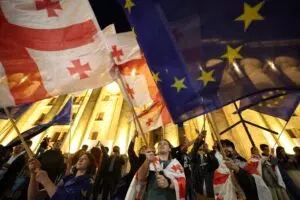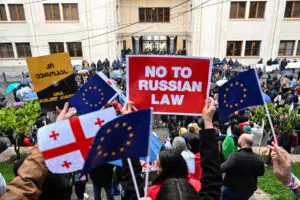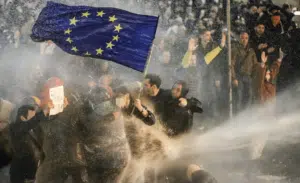Brussels – The road to Georgia’s parliament vote on the controversial Transparency of Foreign Influence bill as the last act of the ruling Georgian Dream party before it returns to the polls on Oct. 26 has been on fire. Harsh protests have been taking place uninterruptedly in the past four days in the capital, Tbilisi, more precisely on Rustaveli Avenue that overlooks the Parliamentary building, spurred by tens of thousands of demonstrators who oppose a law that is very similar to the one in force in neighboring and feared Russia. And from Brussels, all EU institutions have once again sided with the Georgian citizens and their aspirations to one day enter the Union, just as they did a year ago.

After the first the resumption of protests early last week, the demonstration expanded to more than ten thousand protesters on Monday (Apr. 15) to become the largest ever in Georgia only two days later, when Georgian deputies adopted in the first reading the bill slightly amended from the one proposed – and then withdrawn due a landslide of demonstrations – in March 2023. According to the controversial bill, all organizations that receive more than 20 percent of their funding from abroad will have to register as an ‘organization pursuing the interests of a foreign power’ and no longer as an ‘agent of foreign influence’ (as has been in effect in Russia since Dec. 1, 2022). For pro-democracy opposition groups in the country, the substance has not changed from a year ago, which is why, to coincide with this week’s appointment in Parliament, they decided to call for the demonstrations. After three days of organized protests last night (Apr. 18), thousands of Georgian citizens spontaneously returned to Rustaveli Avenue to demonstrate how strongly the issue of the path to EU membership is felt, despite incidents of violence by law enforcement.
“We are concerned about reports of the use of force by riot police to disperse protesters demonstrating against the controversial bill,” is the joint statement of key MEPs with jurisdiction over Georgia (Foreign Affairs Committee Chair, David McAllister, the Chair of the Delegation for Relations with the South Caucasus, Marina Kaljurand, and the Permanent Rapporteur on Georgia, Sven Mikser). The three members of the EU Parliament made it clear that “the right to peaceful protests is a fundamental right and needs to be rigorously respected, especially in a country aspiring to EU membership.” Precisely in this regard, the Transparency of Foreign Influence bill is called “an attack on independent media and civil society organizations,” which not only “is incompatible with the democratic values and principles of the EU” but also puts “at risk the country’s Euro-Atlantic integration.” European Council President Charles Michel a few days ago had also warned that the bill “will bring Georgia further away from the EU and not closer.”

Similar words were used by the EU High Representative for Foreign Affairs and Security Policy, Josep Borrell, and the Commissioner for Neighborhood Policy and Enlargement, Olivér Várhelyi, in a joint statement: “This is a very concerning development, and the final adoption of this legislation would negatively impact Georgia’s progress on its EU path. This law is not in line with EU core norms and values.” of the Union that Tbilisi aspires to join, particularly after receiving the EU candidate country status on December 14, 2023, from the European Council (also conditional on progress on the EU Commission recommendations on civil society freedom and combating disinformation). In the run-up to the final vote in Parliament scheduled for May 17, EU institutions continue to urge the ruling party to “refrain from adopting” legislation that would undermine the foundations of the EU rapprochement path “supported by the overwhelming majority of Georgian citizens.” In other words, it would risk bringing the EU accession process to a halt for the country.
The complex relationship between the EU and Georgia
Despite being granted candidate status for EU membership, the relationship between Brussels and Tbilisi remains particularly complex due to the distance between an overwhelmingly pro-EU population and a government that, to say the least, is controversial about pro-Russian tendencies (although it has since applied to join the Union due to fears raised by Kremlin expansionism). Not only is the difficulty in implementing the reforms required by the path to the Union evident but over the past two years there have been incidents that have highlighted the ambiguity of the ruling Georgian Dream party, whose founder is oligarch Bidzina Ivanishvili, who appears in the non-binding motion of the EU Parliament calling for personal sanctions against him. For example, in May last year, flights between Georgia and Russia resumed after Moscow’s decision to lift the existing ban, and the Caucasian country never aligned with restrictive measures introduced by Brussels against the Kremlin after its invasion of Ukraine. Last fall, the government also attempted to impeach (but failed) the President of the Republic for a series of trips to the European Union that were allegedly a violation of the powers of the head of state under the national Constitution.

Around when Brussels decided not to grant Georgia candidate status yet, in June 2022, there were two large pro-EU demonstrations in Tbilisi: the ‘March for Europe’ to reiterate the people’s alignment with the values of the Union and a town hall calling for the government’s resignation. The common features of these demonstrations were the flags — white and red of the five crosses (national) and with the twelve stars on a blue field — signs with pro-European claims and the Georgian anthem interspersed with the Ode to Joy. Before the outbreak of harsh mass protests in March 2023 – supported by Brussels – which at least so far have led to the shelving of the controversial Transparency of Foreign Influence bill.
In this scenario, one should not forget Georgia’s particularly sensitive relationship with Russia, a country with which it borders to the north. Its candidacy for EU and NATO membership – enshrined in its national constitution – has long been a cause of tension with the Kremlin. After conflicts in the 1990s with the two separatist regions of South Ossetia (1991-1992) and Abkhazia (1991-1993) following Georgia’s 1991 independence from the Soviet Union, on the ground, the situation was effectively frozen for 15 years, with troops of the newly formed Russian Federation defending the secessionists within the claimed territory. The attempt to reassert Tbilisi’s control over the two regions in the summer of 2008 – launched by former President Mikheil Saakashvili – led to a violent Russian reaction on August 7, not only in repelling the Georgian army’s offensive but also leading to the invasion of the rest of the national territory with tanks and air raids for five days. Since then, Vladimir Putin‘s Russia has recognized the independence of Abkhazia and South Ossetia and has deployed thousands of soldiers to the two territories to increase its sphere of influence in the Ciscaucasia region, in violation of the August 12, 2008 agreements.
English version by the Translation Service of Withub







